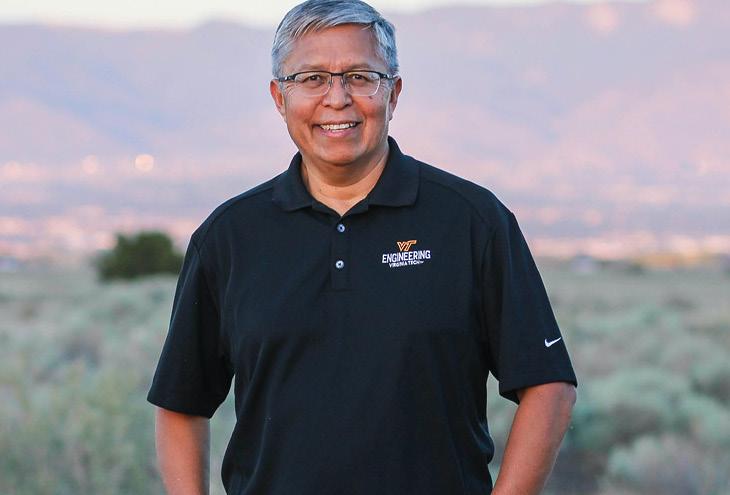Dr. Stan Atcitty, Diné, has a record of tremendous technical success and remarkable achievements as a leader. His ability to cultivate and maintain relationships is paramount to his success. Whether he is presenting to a packed gymnasium at his high school alma mater in Shiprock, N.M., or coaching junior staff members on his team, Dr. Atcitty is energized by finding ways to build people up.
At Sandia National Laboratories, Dr. Atcitty leads over a dozen power electronics research and development projects as part of the Department of Energy’s Energy Storage Power Electronics Program. Additionally, he helps secure funding and helps maintain a partnership with Navajo Technical University and other tribal colleges and universities (TCUs). Under this partnership, Dr. Atcitty mentors Indigenous students and hires TCU students as summer interns.
Within the last year, Dr. Atcitty was both elevated to senior scientist at Sandia and named a Fellow of the Institute of Electrical and Electronics Engineers (IEEE), a global organization that grants this honor to only 0.1 percent of its voting members each year after an extensive evaluation process.
Dr. Atcitty has over 70 publications and holds four patents, with another three pending. He was also recognized by AISES in 2007 with the Technical Excellence Award for his community involvement and technical achievement. In 2012, President Barack Obama presented him with the Presidential Early Career Award for Scientists and Engineers.
A decade after getting his PhD in electrical and computer engineering from Virginia Tech, Dr. Atcitty returned to give the keynote address at the 2016 graduate school commencement. Leading up to that event, Dr. Atcitty said, “Inspiring and encouraging students is my passion — that’s where my heart is.”
Dr. Atcitty has also expressed his commitment to “changing lives one person at a time” because, he says, when you change the trajectory of a single person, you also change the trajectory of a community. As his mentees and students pursue their professional and educational goals, those possibilities become more realistic for others. “It has a ripple effect,” he explains. This is Dr. Atcitty’s focus in his work and in his personal life: building up others so they can accomplish their goals and enhance their communities.
In practice, this “building up” might be weekly conversations or encouragement to accept an internship opportunity for a student who might think they’re unqualified. Or it might be investing quality time with a student thinking about quitting. Being there for someone else can look simple, but the impact can be profound.
During his motivational presentations to a group of students or young professionals, Dr. Atcitty might draw a jagged line on a white board that shows how life will have highs and lows. He advises his listeners not to travel those mountains and valleys alone and encourages them to reach out to relatives or to him. Advisors, faculty members, and others also often want to help. In his work as a mentor, Dr. Atcitty demonstrates that he is their “number one fan.”
In his professional life, Dr. Atcitty is optimistic about progress in his discipline. In response to his recent recognition from IEEE, Dr. Atcitty noted how the work of its members would “allow us to further enhance power electronics research and development for energy storage systems in the nation and throughout the world.” In addition, and in the spirit of “building up,” he noted that his IEEE recognition also “allows me to take some of my national and international influence to increase tribal energy sovereignty, enabling tribes to become more self-determinate nations.”
Dr. Atcitty modestly characterizes himself as a “typical Native dude who grew up on the rez, likes to eat mutton, and speaks the language.” This “typical Native dude” is also a genuinely kind person who focuses on putting others first and knows his words have power. As Dr. Atcitty observes, building each other up is what life is all about.













